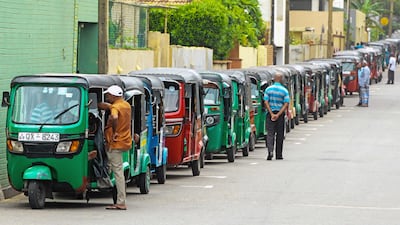Sri Lanka was scrambling to limit the fallout from its fuel crisis on Tuesday, saying companies would have access to additional fuel allocations from the government if they paid in dollars.
The country is experiencing a sharp economic contraction after the Covid-19 pandemic, a crisis worsened by severe economic mismanagement that has seen foreign reserves dwindle, an increase in poverty and crippling government debt.
The government has struggled to pay for basic imports, including life-saving medicine, food and fuel. Of the latter, a shortage of local refining capacity and higher oil prices following Russia's invasion of Ukraine, which has disrupted global energy markets, have worsened the situation.
Huge street protests have rocked the government, leading Prime Minister Mahinda Rajapaksa to resign. Sri Lanka has closed public schools and offices until July 10 to conserve fuel. Roads across the island have been deserted, even as thousands of vehicles queue, waiting for filling stations to be replenished.
Following the latest announcement, potential purchasers must pay as much as a month in advance to open a consumer account at state-run Ceylon Petroleum corporation, Energy Minister Kanchana Wijesekera tweeted on Sunday. Fuel will be issued on a daily or weekly basis from July 12, according to the minister.
“I see this recent announcement by the ministry of power and energy as the natural progression of increased dollarisation in Sri Lanka to meet its near-term challenges,” said Deshan Pushparajah, head of global markets and investment banking at CAL Sri Lanka.
“Dollar preference on the part of the Ceylon Petroleum Corp may drive its larger customers, including the Ceylon Electricity Board, to also make similar pronouncements in the coming weeks.”
Poverty in Sri Lanka has risen sharply and there is no end in sight for the crisis, the World Bank said. It added that 11 per cent of the population will fall below the poverty line this year.









